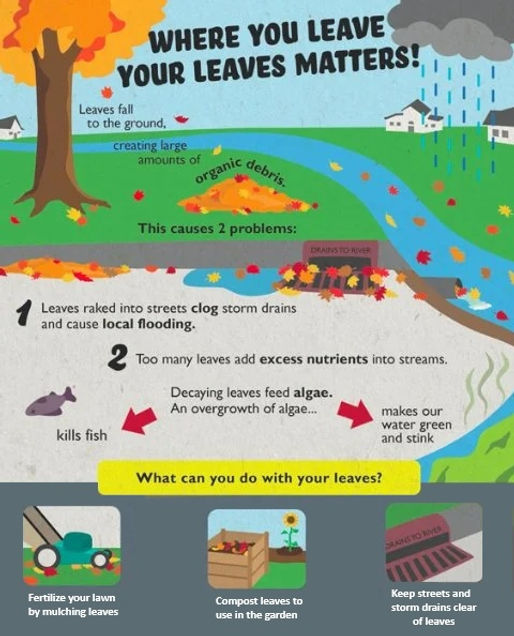
BOROUGH
OF
PENNSBURG
Montgomery County, PA


The Borough of Pennsburg is located is scenic northern Montgomery County. Pennsburg prides itself on being a small, friendly community. With approximately 3,800 residents, Pennsburg Borough covers less than one square mile. Our website provides vital information for residents and visitors about public services, current events, permits, meeting dates and more.
STORMWATER MANAGEMENT
POLLUTION HOTLINE
If you see any type of incident that may impact a storm sewer system, such as an oil spill or other contaminant that may lead to a storm drain, please contact the Pennsburg Borough Office at 215-679-4546, ext. 3, or email a
Stormwater Issue Complaint Form to us at pennsburginfo@pennsburg.us.
Fall Stormwater Management


Managing stormwater pollution in the fall:
- Clean gutters of any leaves or debris
- Dispose of yard waste properly or mulch leaves
- Secure trash cans to prevent litter being scattered
- Fall is a great time to plant native trees and shrubs
which will help rainwater infiltrate the soil
Bringing Biodiversity Back to Your Yard



Why is stormwater management important to our community?
Stormwater management is directly related to our water quality -and water quality affects us all. Managing stormwater properly protects wildlife, maintains a healthy environment around us and ensures quality drinking water.
Pennsburg Borough operates Municipal Storm Sewer Systems (MS4). This underground system of pipes carries rainwater and snowmelt away from roads and parking lots and discharges the drainage water into lakes and rivers. Ideally, this system should transport mostly clean water. But because rainwater and snowmelt from streets, lawns, farms, and construction sites mixes with lawn fertilizers, pesticides, oil, and other pollutants, the runoff becomes contaminated. This contaminated water eventually makes its way to into the storm sewer system and ultimately into our rivers, lakes and streams. Stormwater runoff is the most common cause of water pollution.


SWIMMING POOL WATER DISCHARGE GUIDELINES
Water from swimming pools and hot tubs often contain high levels of chlorine. Discharging chlorinated water into storm drains, streams, irrigation canals or ponds is not permitted due to the danger it may cause fish and other aquatic life.
According to the Department of Environmental Protection, you should follow the following guidelines to dispose of swimming pool or hot tub water.
1. Prior to disposing or using the water for irrigation, shut off the chlorination system if
you have one, or stop adding chlorine.
2. Hold the water in the pool or hot tub for two weeks to reduce the chlorine level.
3. Discharge or use the water for irrigation in an area where the water will not flow into
a stream or storm sewer drain.
4. Discharge or use the water for irrigating your property and ensure it does not flow off
your property.
5. Discharge or use the water for irrigation in a manner that will prevent nuisance
conditions (such as creation of odors, and fly and mosquito breeding conditions).
Nuisance conditions occur when water is held in the pool for a prolonged period.
6. The water should be discharged at a rate which does not create erosion and is able to
be absorbed into the ground.
7. Any solids that have formed in the water should be removed manually.

Questions concerning pool guidelines
should be directed to the PA
Department of Environmental
Protection’s Regional Office:
Southeast Regional Office
2 East Main Street
Norristown, PA 19401
Main Telephone: 484-250-5900
Emergency: 484-250-5900








